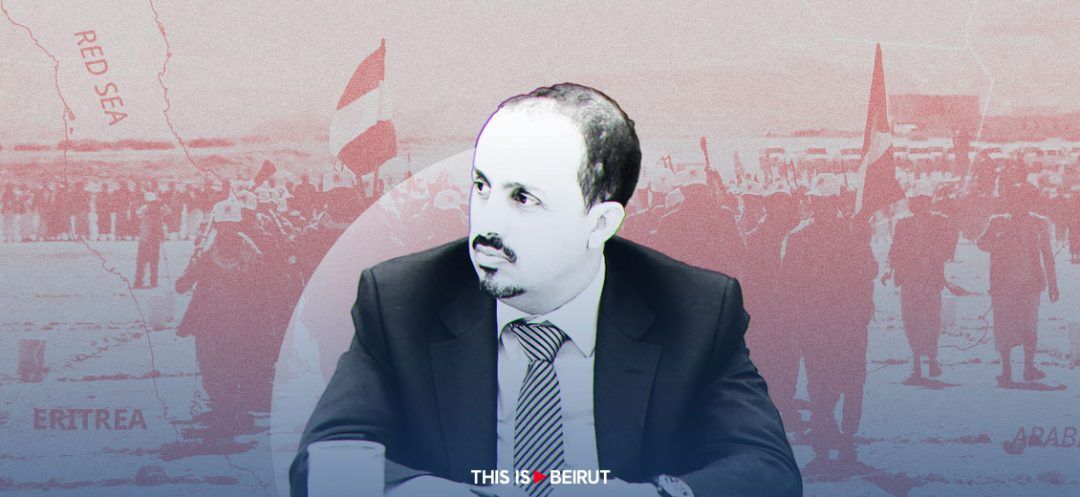- Home
- War in the Middle East
- Yemeni Minister of Information Prosecutes Houthis

The Yemeni Minister of Information, Mouammar al-Iryani, outlines to This is Beirut the Houthis' destabilizing conduct in the Red Sea and Bab el-Mandeb. For him, these actions have no connection to events in Gaza, but serve the Iranian agenda.
What is the true objective behind the Houthi strikes against maritime traffic in the Red Sea? Is it true that they aim to support Gaza?
It is important to clarify that the acts of piracy and maritime attacks carried out by the Houthi militia against merchant ships and oil tankers in the Red Sea and Bab el-Mandeb strait are not a new phenomenon. In 2016, the Houthis launched missiles at the US Navy near the Bab el-Mandeb strait. In 2017, they used remote-controlled explosive-laden boats to attack the port of Al-Mokha in the Red Sea. In 2018, they attacked ships flying the Saudi flag in the port of Al-Hodeida, and on January 3, 2022, they seized the Emirati ship Rwabee carrying medical supplies to a field hospital in the Socotra archipelago off the southern coast of Yemen. They also targeted the Nushayma oil terminal in the Shabwa province and the Al-Dabba port in the Hadramout province. And in mid-November 2022, they attacked an oil tanker in Shabwa, as they indiscriminately laid hundreds of maritime mines in Yemeni territorial waters. So, these terrorist operations have no connection to events in Gaza, which the Houthis use as a pretext and cover to carry out their acts of piracy and threaten international interests. This is to execute the Iranian agenda and show that the Red Sea and the Bab el-Mandab strait are under Tehran's control. We closely followed the statements made by Iranian officials to news agencies, including those of Iranian Defense Minister General Mohammad-Reza Gharaei Ashtiani. These statements, which revealed the true motives behind these attacks, exposed the Houthis' attempts to provide political and moral cover for their terrorist actions in order to gain popular sympathy.
In your opinion, will the targeted airstrikes by the United States and Great Britain against missile launch ramps deter the Houthis?
The Yemeni government held the Houthi militias fully responsible for the military strikes against Yemeni territories under their control, due to their systematic targeting of maritime transport routes and international trade. This comes at a time when Yemenis were awaiting a peace signal, to show that the Houthi terrorist organization constitutes an instrument to execute the Iranian agenda in its attempt to destabilize security and stability in Yemen and the region. Let's be clear, the airstrikes are a message of coercion, but they are not enough to stop the terrorist aggression of this militia, whether it be crimes and violations against Yemenis or attacks against international maritime routes. We witnessed the escalation in the latest attacks, as well as the firing of an Iranian ballistic missile that the Houthis launched at the Marlin Luanda oil tanker from regions under their control, which nearly caused an ecological and economic catastrophe.
Do you believe that the United States is serious about its action to end Houthi control of maritime corridors, especially the Bab el-Mandab strait?
The recent measures taken by the US administration, including the new classification of the Houthis as a "terrorist entity," reversing a previous decision to lift this classification, have been welcomed by Yemen officially and popularly. This is an important step that must be followed by others to make the decision final. Since the uprising in Yemen in 2015 until the ceasefire, concluded under the auspices of the United Nations in 2022, the Coalition to Support Legitimacy in Yemen, led by Saudi Arabia, thwarted hundreds of Houthi militia attacks on merchant ships and oil tankers in international maritime corridors. It also neutralized their threats and secured navigation in the Red Sea and Bab el-Mandeb. Meanwhile, the army, with the support and assistance of the coalition, succeeded in liberating 80% of Yemeni territories and nearly 90% of the coastline, which stretches for nearly 2,200 km along the Arabian Sea, the Gulf of Aden, Bab el-Mandeb and the Red Sea. It was on the verge of liberating the entire coastline, were it not for international pressure to stop this military operation initiated to liberate the city of Al-Hodeida and its three ports. Instead of appreciating these considerable efforts to protect this important international corridor, the international community exerted strong pressure on the Coalition to Support Legitimacy in Yemen and the legitimate Yemeni government to prevent ending the war aimed at restoring the state and thwarting the coup. A veto has also been imposed on the presence of the national army, which was at the gates of the city of Sanaa and the port of Hodeida, citing the humanitarian cost of the war. Furthermore, the classification of the Houthi militia as a terrorist entity was rescinded, and the export of offensive weaponry to the kingdom was suspended. Throughout the years of war, the international community turned a deaf ear to the calls made by the government, warning against the risks of Iranian interference that destabilizes the security and stability of Yemen and the region, knowing that Yemenis, states and populations in the region paid a heavy price. The world thus found itself in direct confrontation with Iranian terrorism and its Houthi instrument in the Red Sea, the Bab el-Mandeb strait and the Gulf of Aden. This is the result of false calculations and an attitude that disregarded warnings about complacency towards the militia and its maintenance as an Iranian proxy on the coast.
Which measures, do you think, should be taken to end the Houthi behavior? And what do you demand from the international community?
As we mentioned before, isolated military operations will not limit the Houthi danger to security and stability in Yemen, the region and the world. A firm action is needed to put an end to the systematic terrorism exercised by Tehran and its instruments in the region, mainly the Houthis. A comprehensive strategy must be developed to neutralize the danger posed by this terrorist militia to security and stability in Yemen, the region and the world, to render it ineffective, and to confront its systematic terrorism and the threat it poses to countries and peoples in the region. A clear message must also be sent to them that their destructive behavior will not go unpunished, by classifying them as a terrorist entity, drying up their sources of income, neutralizing their political and media support and imposing constraints on trade and international relations with this militia. Laws should also be enacted to impose sanctions on Houthi leaders, freeze their assets and restrict their travel. At the same time, efforts should be devoted to providing genuine support to the Presidential Command Council, under the leadership of President Rashad Muhammad al-Alimi, and strengthening the capacities of the legitimate government in political, economic and military aspects. This allows the state to regain its authority over the entire Yemeni territory.
How do you see the situation in Yemen today?
The crisis in Yemen is no longer "hidden," as was often said during the years 2015-2023. The waves of attacks on merchant ships in the Red Sea and Bab el-Mandeb have drawn attention to the country, which is suffering from the weight of the war sparked by the Houthi coup and the threat posed by this militia backed by Iran to regional and global security and stability. A threat that the world always ignored, downplaying the warnings issued about it. Since their emergence in 2004, the Houthis resorted to illegitimate force and violence to create an atmosphere of terror, submission and threats against the state and society. After seizing power following a coup in 2014, the militia used state means against its opponents and competitors in regions under its control. It resorted to racial and sectarian discrimination to achieve its political goals. Throughout the coup period, the Houthis were involved in terrorist activities. Deadly attacks against civilians, the use of heavy weapons, ballistic missiles and drones manufactured in Iran to bomb cities, kidnappings, hostage-taking, prisoner liquidation, torture and rape of female prisoners, destruction of homes, looting of properties, recruitment of children, planting of mines, repression of freedoms, restriction of women's freedom, dissemination of extremist ideas... all of these actions show a clear trend of terrorist behavior. However, the international community continued to ignore the Houthis, the atrocities they commit against civilians in Yemen, their terrorist activities and their impacts that extend beyond Yemeni borders, destabilizing security and stability throughout the region and posing a threat to global peace and security.
How would you describe the relationship between Yemen and Lebanon?
Yemen's relationship with the Lebanese Republic is close and historical. We addressed the Lebanese government and the Ministry of Information to shut down channels and media affiliated with the Houthi militia, which broadcast from Lebanese territories where they established their headquarters. These media outlets work to incite and spread a discourse of discord and hatred among Yemenis. We asked them to freeze terrorist activities. We are aware of the specific situation in Lebanon internally. Our brothers in Lebanon suffer from Iranian interference as much as Yemen does. We hope that Lebanon will regain its vitality and role in its Arab and Muslim environment and become the jewel of the Orient again.
Read more



Comments